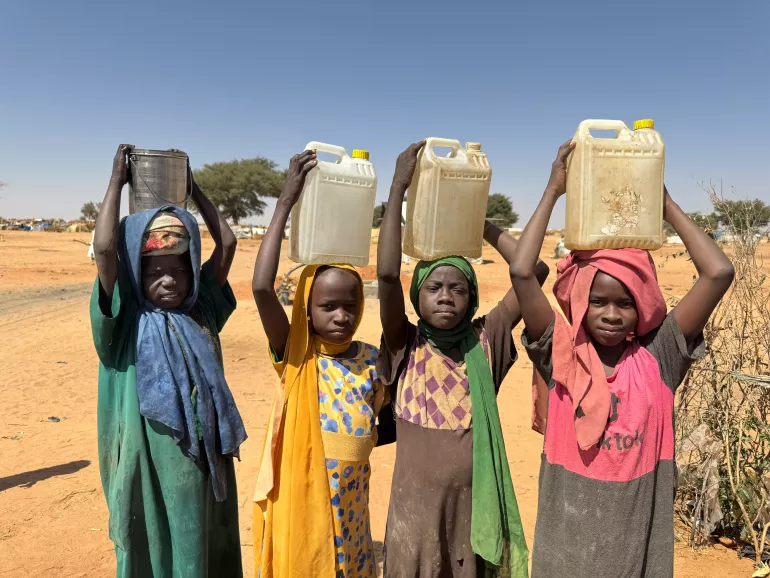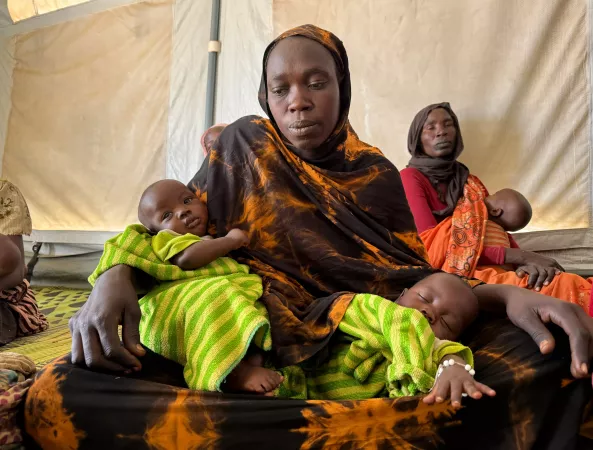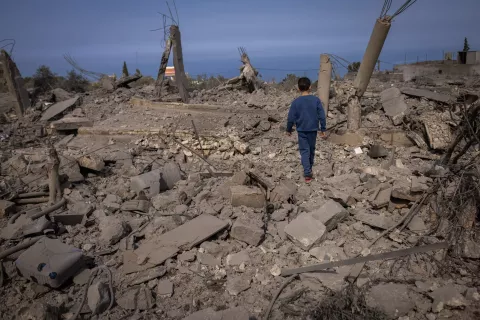This is a summary of what was said by UNICEF Spokesperson James Elder – to whom quoted text may be attributed - at today's press briefing at the Palais des Nations in Geneva

- Available in:
- English
- العربية
GENEVA, 9 February 2024 – “Three hundred days ago a wave of atrocities were unleashed upon the children of Sudan.
“Here is some of what happened in those 300 days:
“First: the world’s largest displacement of children has been seen in Sudan. Four million children have been displaced. That’s 13,000 children every single day for 300 days. Safety, gone. Worldly possessions, gone. Friends and family members separated or lost. Hope, fading.
“Second: The consequences of the past 300 days means that over 700,000 children are likely to suffer from the deadliest form of malnutrition this year. We won’t be able to treat over 300,000 of them without improved access and additional support. Tens of thousands will likely die.
“Third: There has been a six-fold increase in cases of killing, sexual violence and recruitment from a year ago.
That equates to terrifying numbers of children killed, raped or recruited. And these numbers are the tip of the iceberg.
‘Fourth: Two-thirds of the population now lack access to health care.
“This, then, is a war destroying health and nutrition systems, and that is killing people. This is a war destroying the concept of respect for the laws of war, and that is killing people. This is a war destroying families’ ability to feed and protect themselves, and that is killing people.
But this is also a war destroying opportunity, and that destroys a country and the future of an entire generation.
“The true cost of war isn't just measured in casualties but also in the loss of intellectual capital, and this war risks condemning Sudan to future bereft of learning, innovation, progress, and hope.
“I was last in Darfur 20 years ago. This return was, sadly, déjà vu of the deadliest kind. But for the children of Darfur, and the young adults who were once children in Darfur, it was something worse: despair.
“When I returned this past week – I heard stories of deaths from nutrition and deaths from violence – I also met countless 20-somethings for whom dreams had died.
“These youth were small children during the massacres in Darfur 20 years ago. Somehow, their families kept them safe amid that horror. In the proceeding 20 years they latched onto life.
“Those I met – both in Darfur, and newly arrived refugees in Chad – had studied or were studying economics, medical science, engineering, IT. However, in the chaos of this war, the brightest minds have been forced to abandon their studies, their ambitions shattered.
“As 22-year-old Haida said to me in Darfur: “I had a dream – to study medical science. I was living that dream. Now I have nothing. I do not dream. Sadness is my friend.”
Ahmed, 20, now in Farchana, Chad: “I cannot afford to dream here.”
“How then to get out of this nightmare and reawaken their dreams? Those in power need to negotiate a ceasefire, and ensure aid is no longer blocked. Those in the region need to show leadership. Those in donor countries need to show compassion and humanity.
“But with no sign of a ceasefire, we must focus on two things: 1. safe, sustained and unimpeded humanitarian access across conflict lines and across borders; 2. international support to help sustain the essential services that children rely on to survive. Currently we have neither.
“In 2024, UNICEF is appealing for US$840 million to reach 7.6 million of the most vulnerable children in Sudan with humanitarian assistance. Despite the magnitude of needs, last year the funding UNICEF sought for nearly three-quarters of children was not forthcoming.
“Amid so many children overlooked, it’s important to remember what families and communities are doing: most health workers in Sudan haven’t been paid a penny since the war started. But they come to work to help their communities in Sudan. Communities in Chad, already desperately short of food and water, are sharing what they can with refugees.
“People are using every last ounce of strength and resilience to survive and support their communities. Yet, the people of Sudan are increasingly feeling abandoned by the world.
“When it comes to the children and youth of Sudan, the world needs to stop turning a blind eye. Where is our collective humanity if we allow this situation to continue?”
###
Media contacts
Additional resources
About UNICEF
UNICEF promotes the rights and wellbeing of every child, in everything we do. Together with our partners, we work in 190 countries and territories to translate that commitment into practical action, focusing special effort on reaching the most vulnerable and excluded children, to the benefit of all children, everywhere.
For more information about UNICEF and its work for children, visit www.unicef.org/mena
Follow UNICEF on Twitter Facebook Instagram LinkedIn Youtube
Join our UNICEF MENA WhatsApp group to get the latest news. Send us a text message at the following number and we'll add you to our list: 00962790082531





